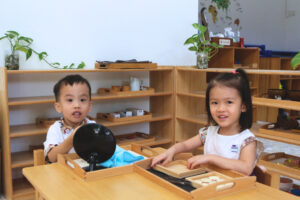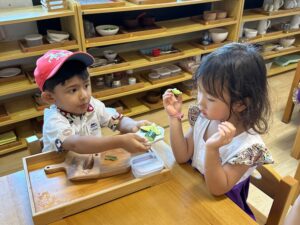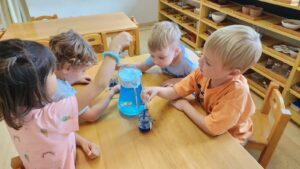As parents, we all want to build strong, loving relationships with our children—connections that help them feel secure, valued, and understood. At House on the Hill, we believe in walking this journey with you, supporting you every step of the way.
Recently, we hosted workshops to share hands-on strategies for deepening your bond with your little one. We loved connecting with so many of our parents, sharing insights, and learning together. Now, we’re excited to pass along some key takeaways that you can bring into your everyday interactions with your child.
Understanding Your Parenting Style
Every parent has a unique approach, but research by developmental psychologist Diana Baumrind highlights three key parenting styles—permissive, authoritarian, and authoritative. At House on the Hill, we encourage an authoritative approach, which balances warmth with clear boundaries. This style fosters a nurturing yet structured environment, guiding children with both love and consistency.
Nurturing a Strong Connection with Your Child
The little moments of connection each day make a big difference in shaping your child’s emotional well-being and social skills. When children feel safe, understood, and supported, they develop the confidence to explore the world around them.
At our workshop, we explored ways to strengthen these bonds, both at school and at home. House on the Hill’s approach—such as mixed-age classrooms and co-regulation strategies—helps children feel secure and supported. The best part? You can apply these same principles in your daily life to build a positive, connected relationship with your child.
Practical Strategies to Strengthen Your Bond
Here are some simple but powerful ways to foster a closer relationship with your child:
- Fill Their Emotional Bank – Regularly show kindness, offer praise, and spend quality time together to build a strong foundation of trust and connection.
- Practice Active Listening – When your child talks, give them your full attention. Make eye contact, acknowledge their feelings, and validate their experiences to encourage open communication.
- Ask Engaging Questions – Instead of the usual “How was your day?” try more specific prompts like, “What made you smile today?” or “What was the most interesting thing you learned?”
- Support Emotional Regulation – Children’s emotional brains are still developing, which is why power struggles happen. Learning to co-regulate with them—staying calm and offering guidance—helps break cycles of frustration and defiance.
- Encourage Independence – Giving your child age-appropriate responsibilities helps them build confidence and resilience. Simple tasks like picking out their clothes or helping with meal prep go a long way.
Helping Your Child Navigate Big Emotions
We’ve all experienced those tricky moments when our child is overwhelmed with frustration or anger—and we’re left unsure of how to respond. It helps to remember that young children are still learning how to manage their emotions. Their brains are developing, and they often need our support to regulate how they feel.
The good news? You can help them through it.
One simple yet powerful approach is to use your words to guide them. Try this 3-step method: Acknowledge – Describe – Offer a Solution.
- Acknowledge their feelings by naming the emotion
- Describe the situation so they feel seen and understood
- Offer a solution or alternative they can accept
For example:
“You’re feeling frustrated. That shoe is really tricky to put on. Let me help stretch it for you.”
Using positive, calm responses helps children feel safe and supported. Over time, this builds their emotional intelligence and strengthens your bond. A small shift in how you respond can make a big difference in how your child learns to manage their big feelings.
Positive Discipline That Nurtures Growth
In our workshop, we explored positive discipline—a method that fosters self-discipline, self-esteem, and emotional regulation.
By setting clear, consistent limits and using logical consequences, you help your child understand the impact of their actions while maintaining a respectful and supportive relationship. Positive discipline encourages children to take responsibility for their choices while feeling safe and loved.
Key Takeaways for Everyday Parenting
- Show kindness and compassion in your daily interactions.
- Recognise and respect your child’s emotional development.
- Use positive discipline to guide behaviour rather than punish.
- Make small, meaningful deposits into your child’s emotional bank every day.
Parenting comes with challenges, but with the right tools and mindset, we can navigate them together. At House on the Hill, we believe that strong parent-child relationships lay the foundation for lifelong learning and emotional well-being.
We’re so grateful to be part of your parenting journey and look forward to continuing to support you. Stay tuned for more workshops and insights—we can’t wait to learn and grow together! 💛








